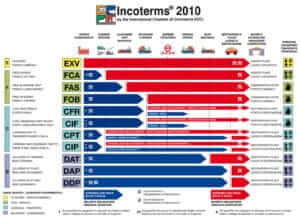
So what exactly is ICC Incoterms?
Who would have guessed that a collection of three-letter acronyms would have had such an impact on the development of international (and domestic) commercial transactions? We can thank a group of industrialists, financiers and traders whose determination to bring economic prosperity to a post-World War I era eventually led to the founding of the International Chamber of Commerce (ICC). With no global system of rules to govern trade, it was these businessmen who saw the opportunity to create an industry standard that would become known as the Incoterms® rules.
11 rules from the Incoterms® 2010 edition
EXW (EX Works) means that the seller has only to place the goods at the disposal of the buyer, at the seller’s premises or at another named place. Seller does not have any other obligation. Any other task of export & import clearance, carriage and insurance is to be arranged by the buyer.
FCA (Free Carrier) means that the seller delivers the goods to the carrier or another person nominated by the buyer at the named place. The parties must specify as clearly as possible the point in the named place of delivery. The risk passes to the buyer at that point.
FAS (Free Alongside Ship) means that the seller delivers when the goods are placed alongside the vessel at the named port of shipment. The seller is obliged to clear the goods for export. From the moment, when the goods are alongside the ship, all costs and risks pass to the buyer. This term can be used for ocean transport only.
FOB (Free On Board) means that the seller delivers when the goods pass the ship’s rail at the named port of shipment. The buyer has to bear all costs and risks to the goods from that moment. The seller must, also, clear the goods for export. This term can be used for ocean transport only.
CFR (Cost and Freight) means that the seller delivers when the goods pass the ship’s rail in the port of shipment. Seller pays the cost & freight necessary to bring the goods to the named port of destination. Also, seller must clear the goods for export. But, the buyer has to bear the risk of loss or damage, as well as any additional costs due to events occurring after the time of delivery. This term can only be used for ocean transport.
CIF (Cost, Insurance and Freight) means that the seller delivers when the goods pass the ship’s rail in the port of shipment. Seller pays the cost & freight necessary to bring the goods to the named port of destination. Seller must clear the goods for export. Risk of loss & damage same as CFR.
The seller also contracts for insurance cover against the buyer’s risk of loss of or damage to the goods during the carriage. The seller is obliged to obtain the minimum marine insurance protection. If the buyer wants to have more insurance protection, it will need either to agree as much expressly with the seller or to make its own extra insurance arrangements.
CPT (Carriage Paid To) means that the seller delivers the goods to the carrier or another person nominated by the seller at an agreed place. The seller must contract for and pay the costs of carriage necessary to bring the goods to the named place of destination. After that moment, the buyer bears all costs. The seller must, also, clear the goods for export. This term may be used irrespective of the mode of transport (including multimodal).
CIP (Carriage And Insurance Paid To) is the same as CPT with the exception that the seller must obtain the minimum marine insurance protection. If the byer wishes to have more insurance protection, it will need either to agree as much expressly with the seller or to make its own extra insurance arrangements.
DAT (Delivered At Terminal) means that the seller delivers when the goods, once unloaded from the arriving means of transport, are placed at the disposal of the buyer at a named port or place of destination. “Terminal” includes a place, whether covered or not, such as quay, warehouse, container yard or road, rail or air cargo terminal. Seller pays for carriage to the terminal, except for costs related to import clearance. In addition, seller bears all risks involved in bringing the goods to and unloading them at the terminal at the named port or place of destination.
DAP (Delivered At Place) means that the seller delivers when the goods are placed at the disposal of the buyer on the arriving means of transport ready for unloading at the named place of destination. The seller pays for carriage to the named place, except for costs related to import clearance and bears all risks prior to the point that the goods are ready for unloading by the buyer.
DDP (Delivered Duty Paid) means that the seller delivers the goods when the goods are placed at the disposal of the buyer. The goods must be cleared for import on the arriving means of transport ready for unloading at the named place of destination. The seller bears all the costs and risks involved in bringing the goods to the place of destination. In addition, the seller is obliged to clear the goods for export and import. The seller has also to pay any duty for both export and import and to carry out all customs formalities, including the payment of taxes and custom fees.
